
Celeriac Puree
November 14, 2013
Make Resolutions A Reality Now!
November 19, 2013Caffeine has some helpful properties too when it comes to athletics and performance. Certain people do well on it and this is partly because based on your genes, specifically the CYP1A2 gene. If you are a slow metabolizer of caffeine you are less likely to benefit from the endurance performance-enhancing effects of caffeine and you have a heightened risk of high blood pressure if you consume more than 200mg per day. If you are a fast metabolizer you will likely benefit athletically from caffeine as well as find it may have a cardio protective function with 2-3 cups per day. I’ll share more about genetic testing for nutritional customization later on in the program.
Personally, I’ve used caffeine while training for and racing my Ironman and I can attest to it being very helpful for athletic performance. I found that after being on a bike for 5 hours, that during the last couple hours of training it was really hard to stay focused and interested in what I was doing (you can only spend so long in the saddle). So in addition to the caffeine added to some of my sports products like gels, I used about 50-100mg of caffeine per hour or so, for training efforts over 4 hours. I found this was enough to keep me focused and pushing for the entire day of swimming, biking and running. In my race, I followed the same protocol, but based it more on “feel” because the day was so long. I looked at it as an exception for events over 6 hours where you are really pushing your body to the limits, it’s not something I would do every day.
Caffeine and coffee are almost synonymous. Coffee is a staple in most North American’s diet, but is it good for us? The answer is not cut and dry. One of the main issues with coffee is that it contains caffeine, a drug that we can quickly develop a dependency on. Caffeine is a naturally occurring ingredient in coffee, as well as tea, cola, kola, guarana and yerba mate, and a manufactured ingredient in some medications. Other issues involve the processing and production of coffee and even decaffeinated coffee can be of concern as well due to the chemical processing that removes the caffeine from coffee.
Coffee does have antioxidants and according to a 2005 article, it is also the number one source of antioxidants in the US diet! This statistics is shocking and disturbing! However, to it’s credit the antioxidants in coffee offer a protective benefit and have been stated to reduce the risk of dementia, stroke, various cancers (liver & prostate and skin), Type 2 diabetes, Parkinson’s and depression in women.
How much is too much and what are the risks?
Health Canada says adults should limit their caffeine intake to 400 mg per day (about two 8 oz cups) to avoid adverse health affects, though everyone’s sensitivity is different. Caffeine has been shown to increase alertness and the ability to concentrate, but in high amounts or in caffeine-sensitive individuals can lead to insomnia, headaches, irritability, nervousness, increase blood pressure and decreased bone health.
Caffeine and Cortisol
Caffeine also elevates levels of the stress hormone cortisol. Athletes and those with inflammatory conditions can take note because, elevated cortisol levels have been linked to increased inflammation, and risk of injury and decreased immunity.
Caffeine and Insulin
Habitual coffee consumption also increases insulin resistance, meaning the cells are less responsive to glucose transport into the cells, leading to higher blood glucose levels. The combination of chronic coffee consumption along with refined carbohydrates (muffins, cookies, pastries and other baked goods) will result in erratic blood sugar levels, moods and brain function.
Caffeine and Electrolytes
Studies now show that caffeine not the diuretic that it was once thought to be, especially when consumed regularly. However, it can disrupt our electrolyte balance and may increase needs for B-vitamins and iron.
How does caffeine affect athletic performance?
Caffeine was removed from the World Anti-Doping Agencies list of banned substances in 2004, and since then caffeine intake during athletic training and racing events has become more popular and almost common practice.
Caffeine has been reported to have an enhancing effect on prolonged, sub-maximal exercise (think long distance training and racing). This is mostly due to the changes in the central nervous system medicated effect not the previously held theory of changes in rates of carbohydrate and fat oxidation. Also newly reported is that lower doses of caffeine appear to have a positive affect on both training capacity and endurance based performance, with doses of 2-3mg/kilogram of body weight 60 mins before exercise. Endurance based performance tasks are often enhanced by 2-3% with caffeine ingestion.
Other research suggests that caffeine improves continuous performance during exercise-to-exhaustion for endurance activities, such as the marathon, half iron distance or iron distance triathlon, due to its stimulant effect, delaying fatigue and decreasing sensitivity to pain. There is some research to suggest that caffeine can be used as a performance enhancer in shorter events. These ergogenic effects of caffeine, however, seem to decrease with daily consumption.
A 2008 study published in the Journal of Applied Physiology reported that in highly-trained athletes the ingestion of both carbohydrates and caffeine (vs carbohydrates alone) after exhaustive exercise increases the re-accumulation of muscle glycogen over a 4 hour window. This suggests that caffeine improves and lengthens the recovery window where energy can be stored, which may be useful for multi-day events and races.
Newer research suggests that the ergogenic effect of caffeine has little to due to the metabolic effect, ie carbohydrate or fat metabolism during endurance exercise, but rather appears to involve the central nervous system and possibly by altering brain neurotransmitter function (Kalmar and Cafarelli 2004). A dose of about 2-3mg/kg body weight, 60 mins prior to training and racing is sufficient to enhance training capacity and endurance performance. Put in perspective a 150lb person (66kg) would consume about 130-200mg of caffeine 1 hour before exercise and repeat that dosage a few hours in to continue to effect.
However, some research is also suggests an alternate mechanism for some with the performance enhancing effects. The proposition is that the performance enhancement such as increased alertness and energy are really just the reversal of caffeine’s withdrawal effects.
My take on caffeine overall
I’m ok with caffeine when it is consumed moderately; a loaded term I know, especially when most peoples idea of moderate is too high for things they approve of (such as coffee, booze and sweets) and too low for things they don’t like doing (exercise). I believe caffeine serves a place in endurance athletics for such reasons as decreased pain sensation, as well as helping to keep you focused and your head in the game when your training or racing long hours, but it’s no substitute for a proper fueling and hydration plan. Same holds true in a professional setting before a presentation or an exam or if you have to drive a long distance early morning or at night and you need to be alert.
My main concern with caffeine is that people tend to abuse it (intentionally or unintentionally) and use it as a crutch. They have caffeine because they think they need it or because it’s the social thing to do. They don’t stop to assess if its really necessary, the act is mindless. Maybe their bodies are actually demanding water or food instead, but we are programmed to make the easy and convenient choice. But caffeine is still a (legal) drug and when people consume it in excess with out regard for their health and it’s affect on the body problems can arise. Ultimately it’s all about balance. The other choices you make in your diet will dictate how caffeine affects you overall. You have to look at the whole picture.
Like many things, coffee is best in small amounts, consumed occasionally. It’s all about balance. If it’s something you are having each day in multiple cups then try cutting back to one per day. If you are having only 1 cup per day then why not try having coffee every other day, or just on weekends. Reduce your reliance on stimulants for daily energy and focus on nourishment for energy instead. As a result you’ll have more, longer lasting energy without the ups and downs from coffee and caffeine.
Caffeine Amounts In Popular Products
| Coffee & Tea | Other | Sports Aids |
| Starbucks Grande Drip: 16oz = 330mgStarbucks Venti Drip: 20oz = 415mgStarbucks Grande latte = 150mgTim Hortons Medium =100mg
Large =140mgEspresso (2oz)= 60-90mg Generic Decaf 8oz = 5-10mg Black Tea 8oz= 40-110 mg Oolong tea 6oz = 12-55mg Green Tea 6oz = 15 mg |
5 Hour Energy ~ 260 mgMonster Energy 16oz= 160mgRed Bull = 80mgDiet Coke 12oz = 47mg
Coke: 12oz = 35mg Hot Chocolate 12 oz =14mg Medication:Excedrin, extra strength = 65 mg |
GU Energy Gel- Chocolate Outrage = 20mgCliff Shot Energy Gel- Strawberry = 25mgPower Gel Double latte-50mg |
Want to cut back?
Don’t quit cold turkey! If you do you are likely to get withdrawal symptoms, such as irritability, headaches, nausea and shakes. Instead, wean yourself off slowly over multiple days or weeks depending on your starting consumption level. Start drinking a rotation of herbal teas such as peppermint, chamomile, dandelion, nettle and ginger or simply some hot water with lemon. Have it first and then see if you still need/want your coffee.
Here is one more reference is on how coffee impacts your hormones. http://www.precisionnutrition.com/coffee-and-hormones.
Looking for a substitute that tastes rich and creamy like coffee? Try these options:
Bambu Coffee Substitute- http://www.avogel.ca/en/health-food/bambu-instant.php
Teechino- http://teeccino.com
Yerba Mate, Green Tea and Matcha tea are all great substitutes as well.
Want to know more about caffeine and how to use it to increase your athletic performance or how to safely reduce your caffeine intake? Contact Tara at Tara@heal-nutrition.com to set up your consultation.





